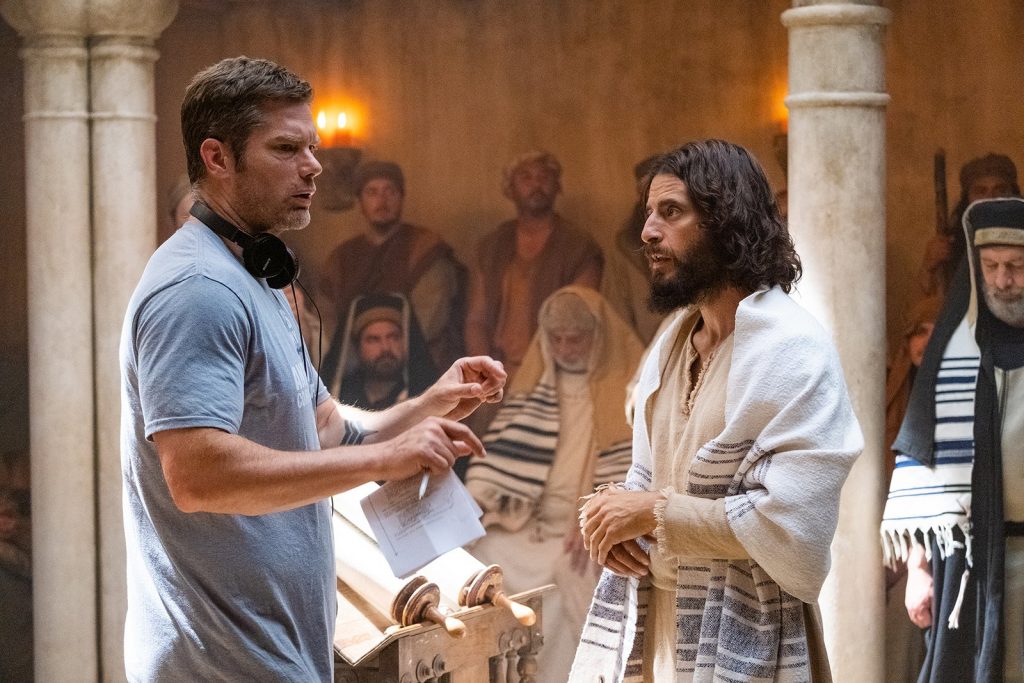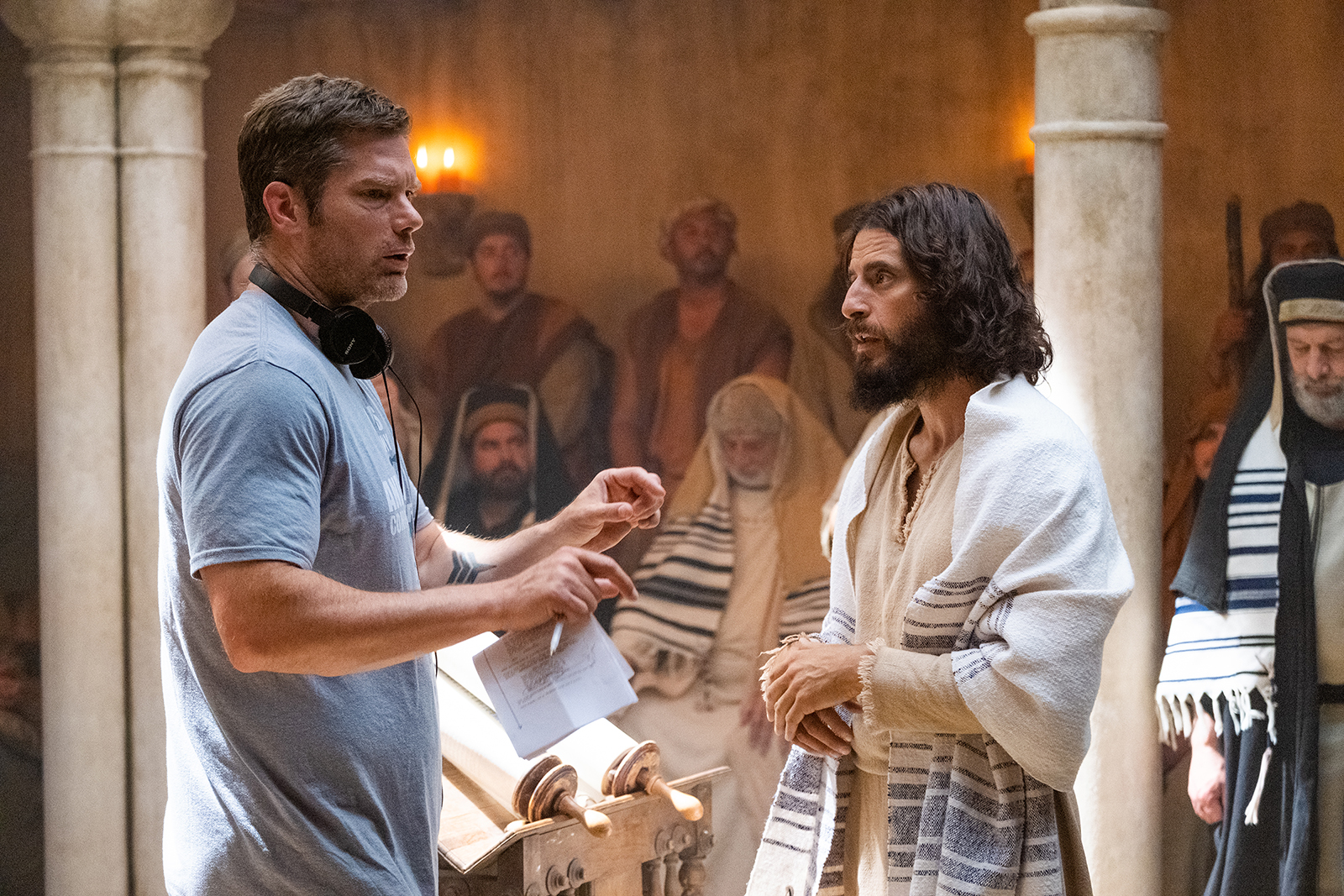
(RNS) — “All right, let’s give it up for Jesus!” said Jonathan Falwell, son of conservative Christian activist Jerry Falwell and the campus pastor at Liberty University in Lynchburg, Virginia.
Thousands of students cheered in the packed stadium on Feb. 3 as Falwell gestured to a man on stage in a leather jacket, skinny jeans and a neon-orange sneaker and beanie combo.
Jonathan Roumie, the 48-year-old actor who plays Jesus in the wildly popular TV series “The Chosen,” grinned and pointed upward. He’d just finished speaking at one of Liberty’s mandatory worship services, promoting the season three finale of “The Chosen” and his new film, “Jesus Revolution.” As the Q&A wrapped up, Falwell urged Roumie to “do the Jesus accent.”
“Everyone here is loved by God. We’re here to tell all of you that God loves you. No matter your flaws, no matter your weakness. God loves you,” Roumie declared in a Middle-Eastern accent.
Weeks earlier, Roumie was greeted by shouts at The March for Life in Washington, D.C., where he began his anti-abortion speech by reminding the crowd of his humanity.
“I’m not the real Jesus. Let’s just get that out of the way. TV Jesus, real Jesus,” said Roumie, gesturing first to himself, then skyward. “Jim Caviezel movie Jesus,” he added in a playful nod to the actor best known for his role as Jesus in Mel Gibson’s 2004 film, “The Passion of the Christ.”
There aren’t many people who need to preface speeches with reminders they are not, in fact, God incarnate, but Roumie is part of an elite club of creatives who have starred in widely known portrayals of Jesus. And, as his fame grows, Roumie has discovered, like Caviezel and others before him, that portraying Jesus can be a pathway to an unusual kind of stardom. It’s a type of celebrity that, as with U.S. Christianity itself, is wrapped up with the country’s politics — in Roumie’s case, the conservative variety.
Roumie, raised by an Irish mother and Egyptian father in a Catholic home in and around New York City, speaks often of how he spent eight years in L.A. booking one-off gigs before landing “The Chosen.” Roumie previously played Jesus in church passion plays and in three short films for “The Chosen” creator Dallas Jenkins.
Director Dallas Jenkins, left, and actor Jonathan Roumie, portraying Jesus, discuss a synagogue scene for season three on the set of “The Chosen.” Photo courtesy of Angel Studios
The fan-funded series has won over many critics. Rhonda Burnette-Bletsch, department chair of biblical studies at Eastern University in St. Davids, Pennsylvania, pointed to Roumie’s performance as central to the impact of “The Chosen,” saying, “I think that The Chosen is making Jesus human in a way that conservative Christians and Catholic Christians are more comfortable with.”
In addition to his divinity, she said, Roumie’s Jesus is one that “can crack a joke,” or “wink at someone and tease his followers.”
The approach has earned Roumie 412,000 Instagram followers and another role as the troubled Jesus lookalike, Lonnie Frisbee, in the new film “Jesus Revolution” from Lionsgate and the faith-based Kingdom Story Company. The movie tells the true story of a large-scale conversion of hippies in a coastal California town.
Brent McCorkle, one of the film’s directors, told RNS Roumie was their No. 1 choice for Frisbee.
“We couldn’t have predicted how popular “The Chosen” has gotten at this point. So I think on a commercial level, it’s turned out to be so great,” said McCorkle, adding that Roumie’s “intense” personal faith adds authenticity to his portrayals.
That faith is central to Roumie’s public appearances as well. At the March for Life, he urged attendees to pray the rosary and also hosts live prayers on Instagram, some of which have been viewed nearly 100,000 times.
“I know who I am, and I know my identity in God, and my faith helps keep me on track,” Roumie told RNS. “For me, Mass is a part of that. The sacraments are a part of that.”
Roumie has said he spoke at the anti-abortion rally because he sees it as a “social” issue, not a political one. But abortion is undeniably a divisive topic in the U.S., and Roumie’s choice of speaking venues signals a political slant — including Liberty, a Christian school with deep ties to Republican politics and former-President Donald Trump.
Roumie’s forays into conservative politics echo the activism of Caviezel, who made headlines in 2021 for speaking at a conference associated with the conspiracy theory-driven QAnon movement. In remarks that fused versions of a Ronald Reagan address and a speech from another Gibson movie, “Braveheart,” Caviezel railed against abortion, masks and Pope Francis.
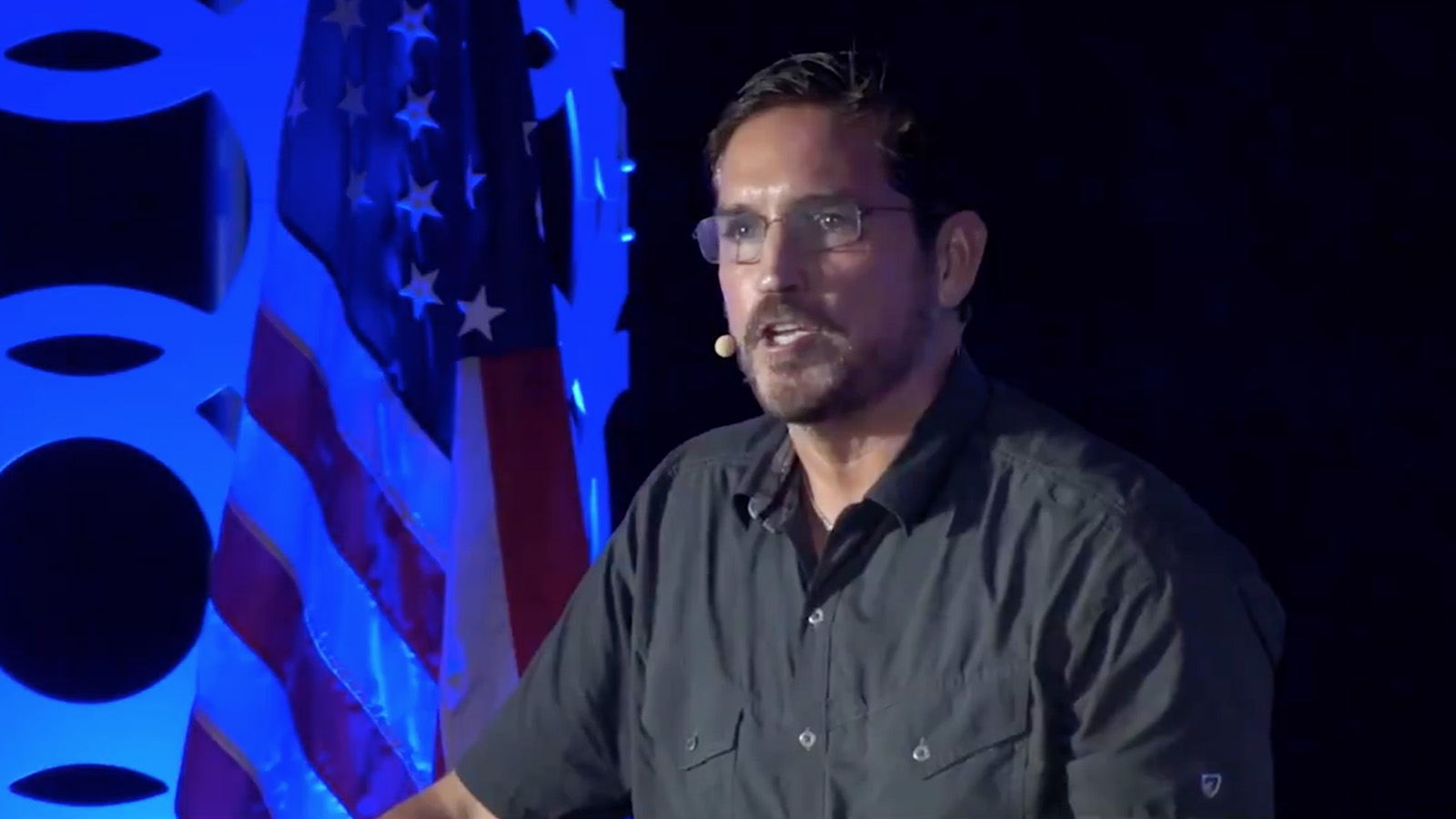
Jim Caviezel speaks at the “For God & Country: Patriot Double Down” conference in Las Vegas. Video screen grab
Roumie may be carving out a less strident form of political engagement compared to Caviezel. “The Chosen” actor will headline this year’s National Men’s Conference in Cincinnati, Ohio — a Catholic conference that lost its sponsorship from The Archdiocese of Cincinnati in 2022 due to concerns about the “baggage” carried by keynote speakers, which included Caviezel.
Even so, the two actors are already teaming up: During Lent, Roumie and Caviezel will read Thomas à Kempis’ “The Imitation of Christ” on Hallow, a Catholic prayer app.
Both men are following a path blazed by Charlton Heston, who portrayed multiple biblical roles over his career, including Moses and John the Baptist. Heston, a friend of fellow actor and former Republican President Ronald Reagan, eventually became the head of the National Rifle Association in 1998, serving until 2003.
According to Diane Winston, the Knight Center Chair in Media and Religion at the University of Southern California’s Annenberg School for Communication and Journalism, the overlap between actors who portray Jesus and conservative politics often reflects the theology or politics of people behind the camera. She noted “Passion of the Christ” and its direction by Gibson, who has long attracted controversy for voicing conservative and even antisemitic views.
“He had a very strong Christological sensibility and portrayed Jesus as empathetic but basically as a paragon of suffering and took a conservative religious and theological perspective to heart in framing his picture,” she said. “That’s going to, in general, attract a different kind of audience.”
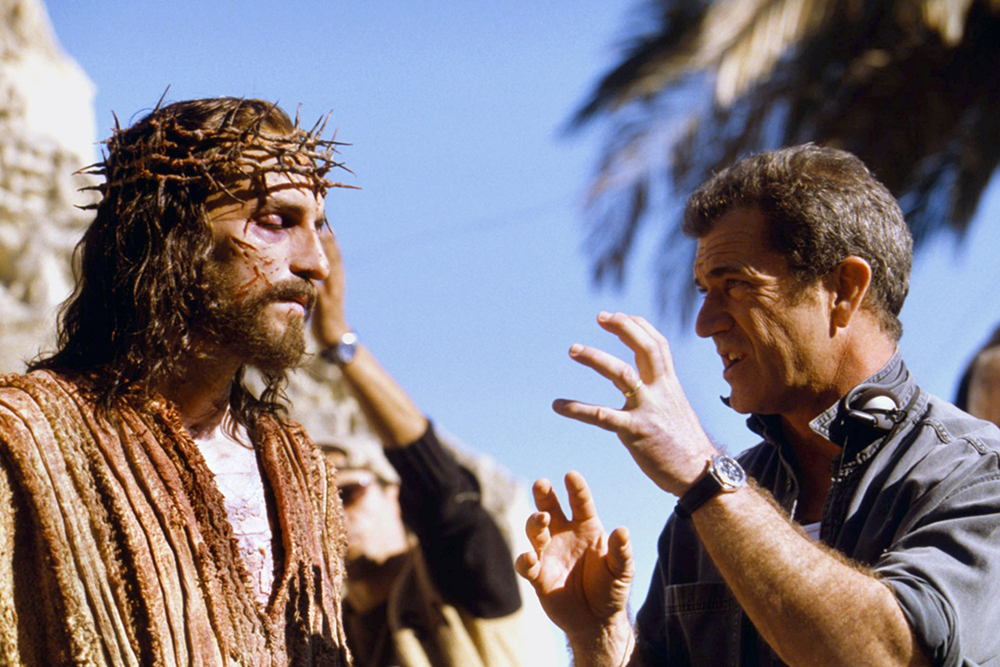
Mel Gibson, right, directs Jim Caviezel in his portrayal of Jesus for “The Passion of the Christ.” Photo by Philippe Antonello/Icon Distribution Inc.
Winston contrasted Gibson’s depiction of Jesus with earlier big-budget productions such as 1973’s “Godspell” and 1988’s “The Last Temptation of Christ,” which were more representative of liberal-leaning counter-cultures than conservative Christianity. Whereas Gibson’s film was produced after the rise of the religious right in the 1990s, other portrayals of Jesus, such as Willem DeFoe in “The Last Temptation of Christ,” spoke to a different time.
There are always multiple social movements operating at any time, she said, but movies about Jesus often at least partly reflect “the era in which a film is made.”
Not all actors who play Jesus end up on the Christian celebrity circuit. DeFoe is perhaps better known for playing Spiderman’s nemesis than Christ, and Victor Garber, who performed the role of Jesus in “Godspell,” is more recognizable as professor Callahan from “Legally Blonde.”
“For some actors, it’s just a gig, a good famous role. For others, like Jim Caviezel … he was known before the “Passion” was made for being an openly Catholic actor,” observed film critic Peter Chattaway.
And then there’s Ted Neeley, who played Jesus Christ Superstar in the 1973 film. The Texas-born rock ‘n’ roller told RNS his life was changed by the role he played 50 years ago, which gave him his family — he met his wife, Leeyan Granger, in the cast — and his career.
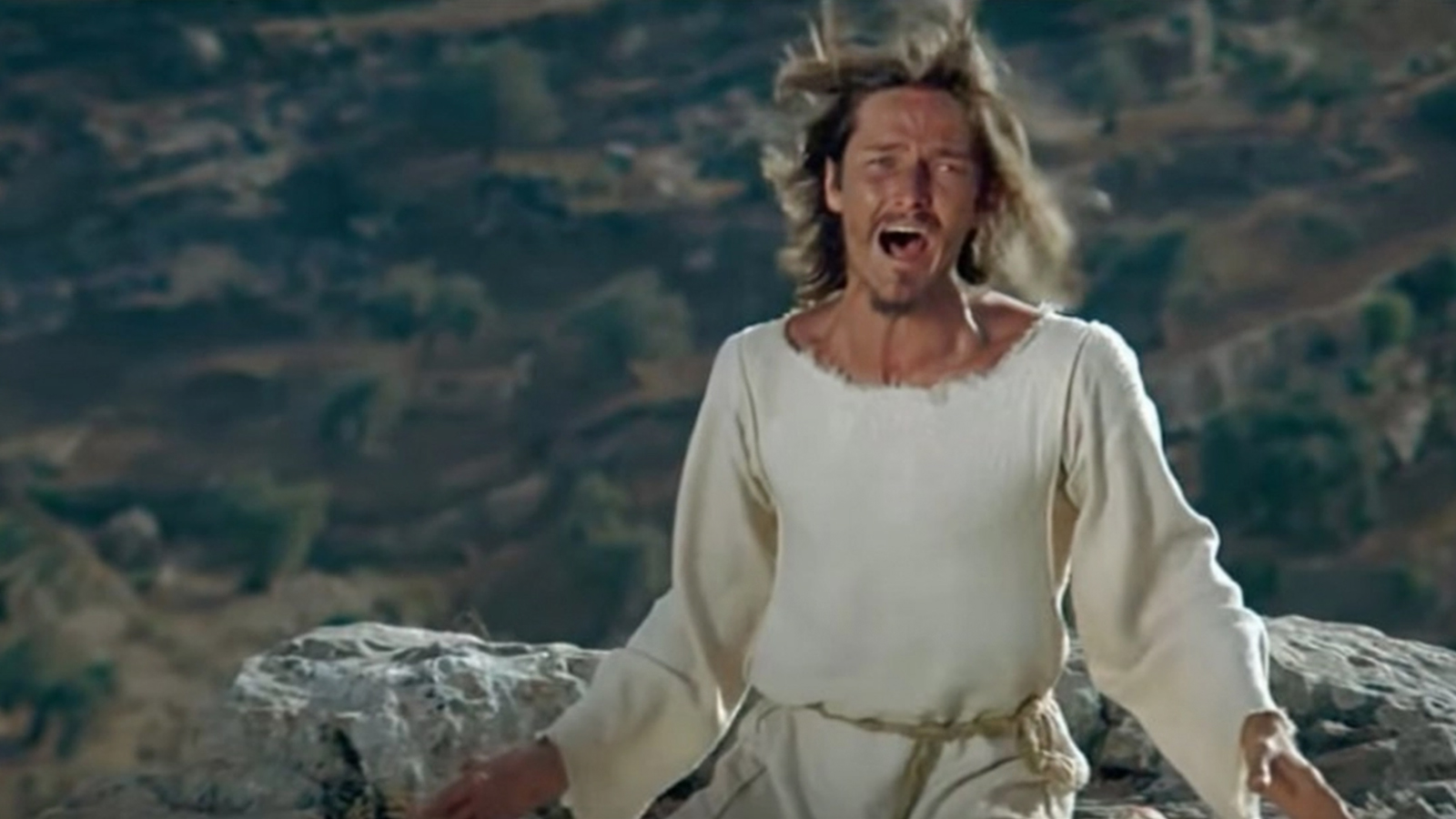
Ted Neeley as Jesus of Nazareth in the 1973 film, “Jesus Christ Superstar.” Photo courtesy of Universal Pictures
Neeley has been performing the role of Jesus off and on since, and this year he can be found hosting 50th anniversary movie screenings in theaters across the country. He told RNS he “absolutely” feels the role has made him a religious figure in the eyes of some of his fans.
“I’m so honored that they respect me like that because of the film. But I let them know that, well, thank you so much, but I’m not Jesus, you know that. They’ll say, yes we do, but you give us an inspiration that makes us wish we could have met Jesus face to face.”
Burnette-Bletsch suggested Roumie and Caviezel’s Catholic backgrounds give them similar access to certain religious circles, but modern elements can change dynamics.
“Now we’re living in the age of the influencer. There’s a different kind of access to your audience,” said Burnette-Bletsch. These days, she argued, viewers can interact with celebrities via social media and livestreams. And as a long-term, multi-season project, “The Chosen” “cements the character as the person they are portraying, I think, in the minds of audiences,” she said.
And as Americans embrace the streaming era, where television shows are broadcast on a dizzying array of platforms and regularly approach the quality (and budget) of feature films, multiple depictions of Jesus can impact U.S. society simultaneously. Winston pointed to the comedic sitcom Black Jesus, which aired on Adult Swim from 2014 to 2019 — overlapping briefly with the runtime of “The Chosen.” Starring Gerald “Slink” Johnson as Jesus, Black Jesus was based in Compton, California, and garnered a following while also drawing controversy for depicting characters who cursed and smoked marijuana.
As media becomes increasingly targeted at an array of audiences, Winston said, “more niche versions of Jesus are possible.”

